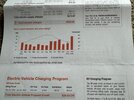Welcome to Tesla Motors Club
Discuss Tesla's Model S, Model 3, Model X, Model Y, Cybertruck, Roadster and More.
Register
Install the app
How to install the app on iOS
You can install our site as a web app on your iOS device by utilizing the Add to Home Screen feature in Safari. Please see this thread for more details on this.
Note: This feature may not be available in some browsers.
-
Want to remove ads? Register an account and login to see fewer ads, and become a Supporting Member to remove almost all ads.
You are using an out of date browser. It may not display this or other websites correctly.
You should upgrade or use an alternative browser.
You should upgrade or use an alternative browser.
What are your home electricity rates?
- Thread starter 81kWh
- Start date
Xenoilphobe
Well-Known Member
Lucky, you guys have gas and coal and wind.
Daytonaviolet
Member
Mine is ev2a on pacific gouge & extort as wellI could only dream of rates that low. OP, willing to post your schedule? I wouldn't be surprised if you're excluding other costs like distribution and you may have a base fixed monthly cost.
I'm not on EV2-A but as I posted at PG&E EV2A rate went up by 20% March 1, it's 34.5 cents per kWh off-peak. Rest of day it's 51.3 to 65.7 cents per kWh. See page 2 of https://www.pge.com/tariffs/assets/pdf/tariffbook/ELEC_SCHEDS_EV2 (Sch).pdf.
Since I don't charge my EVs at home on Pacific Gouge & Extort, I'm on E-TOU-C. See page 2 of https://www.pge.com/tariffs/assets/pdf/tariffbook/ELEC_SCHEDS_E-TOU-C.pdf. For the tier 1 (everything within baseline), you get 10.5 cent per kWh credit. Baseline is ~290ish kWh for every 30 day billing period. Anything beyond baseline doesn't get the credit. Rates are 48.7 to 61.8 cents per kWh depending on when. Subtract the 10.5 cents per kWh for the baseline usage.
As an added bonus, somehow Hudson, MA can deliver power for like $0.065/kwh all in, but the best 90% of the state served by Eversource or NationalGrid can get is around 0.33, or roughly FIVE times what is charged in Hudson for essentially the same product.MA State can spend $115 million (and more) to feed and house illegal immigrants but the DPU cannot negotiate with the utilities to offer discounted EV charging. And the governor has plans to have millions of EVs on the road. Tax dollars are being totally well spent.

Residential | Hudson Light & Power
Are you a resident or a residential landlord? Hudson Light & Power provides information on rates, rebates, safety and more. You can also sign up for a new account and pay your bill online.
 www.hudsonlight.com
www.hudsonlight.com
I haven't looked at the rates the other ~40 municipal electric suppliers in MA charge, but I know there won't ever be any more because someone decided to outlaw new ones (literally)
Decades ago, I worked for a guy who was part of the 'deregulate supply' plan. They had a report that came right out and said it would be bad for the consumer but pushed it right through anyway. Welcome to Massachusetts!
chuanren20
Member
I am paying 13.5 cents per KWH(after all the fees and taxes) at my home here in Texas.
Tesla Super Charging stations are 33 cents per KWH to 38 cents per KWH here
Other charging stations are 45 cents per KWH to 55 cents per KWH here
Based on my simple calculations against about same size gas vehicles and gas price here, now it's cheaper to charge at home, about the same cost if charging at Telsa Charging stations, and it will be more expensive(than gas vehicles) if charging at other charging stations.
Tesla Super Charging stations are 33 cents per KWH to 38 cents per KWH here
Other charging stations are 45 cents per KWH to 55 cents per KWH here
Based on my simple calculations against about same size gas vehicles and gas price here, now it's cheaper to charge at home, about the same cost if charging at Telsa Charging stations, and it will be more expensive(than gas vehicles) if charging at other charging stations.
Coming from Southern California, I pay 23 cents for off-peak/super off-peak rates which seems ridiculously high given how some states seem to be as low as < 10 cents. I don't see a reason why So Cal Edison needs to charge an expensive rate for Off-peak when it should be say 8 to 13 cents during that period.
Last edited:
This week I just found out that our Idaho Public Utilities Commission gave their ruling in January, and that's it--we lost. There were 846 public comments before the commission and ALL were opposed to Idaho Power's proposal, but the PUC ruled in favor of it anyway. They changed net metering from the per unit kWh credit that tracked throughout the year to this extortionate real time metering, where they pay out only about 4 or 5 cents per kWh for what is generated, and people have to pay full retail rate at all other times for what they draw back out.
That just murdered the solar industry in the state. It's not cost effective to install solar at all anymore.
One of the really cheeky things in the ruling was about environmental benefit. Sierra Club and similar groups had brought up if customers' solar generated energy should have any extra value as far as clean energy credits, rather than strictly the dollars and cents versus what could be purchased on the open energy markets from coal or natural gas. The commission ruled no, because Idaho doesn't have a market for valuing and selling clean energy credits generated by consumers like some states do, and there isn't a national system for it too. So yeah, OK, that's true.
But here's the kicker: Idaho Power had also requested from the commission that they just straight up TAKE outright ownership of people's clean energy credits, in case they do become worth something in the future from a future law change. The commission did fortunately rule that the theft of people's virtual property rights like that was not appropriate, and they belonged to the homeowners who own the panels. But daaayum, that was ballsy of Idaho Power to try to steal them.
That just murdered the solar industry in the state. It's not cost effective to install solar at all anymore.
One of the really cheeky things in the ruling was about environmental benefit. Sierra Club and similar groups had brought up if customers' solar generated energy should have any extra value as far as clean energy credits, rather than strictly the dollars and cents versus what could be purchased on the open energy markets from coal or natural gas. The commission ruled no, because Idaho doesn't have a market for valuing and selling clean energy credits generated by consumers like some states do, and there isn't a national system for it too. So yeah, OK, that's true.
But here's the kicker: Idaho Power had also requested from the commission that they just straight up TAKE outright ownership of people's clean energy credits, in case they do become worth something in the future from a future law change. The commission did fortunately rule that the theft of people's virtual property rights like that was not appropriate, and they belonged to the homeowners who own the panels. But daaayum, that was ballsy of Idaho Power to try to steal them.
BroncoAZ
Member
That’s unfortunate. Conversely they likely spawned a whole new interest in battery storage and peak shaving by those who have solar already.This week I just found out that our Idaho Public Utilities Commission gave their ruling in January, and that's it--we lost. There were 846 public comments before the commission and ALL were opposed to Idaho Power's proposal, but the PUC ruled in favor of it anyway. They changed net metering from the per unit kWh credit that tracked throughout the year to this extortionate real time metering, where they pay out only about 4 or 5 cents per kWh for what is generated, and people have to pay full retail rate at all other times for what they draw back out.
That just murdered the solar industry in the state. It's not cost effective to install solar at all anymore.
One of the really cheeky things in the ruling was about environmental benefit. Sierra Club and similar groups had brought up if customers' solar generated energy should have any extra value as far as clean energy credits, rather than strictly the dollars and cents versus what could be purchased on the open energy markets from coal or natural gas. The commission ruled no, because Idaho doesn't have a market for valuing and selling clean energy credits generated by consumers like some states do, and there isn't a national system for it too. So yeah, OK, that's true.
But here's the kicker: Idaho Power had also requested from the commission that they just straight up TAKE outright ownership of people's clean energy credits, in case they do become worth something in the future from a future law change. The commission did fortunately rule that the theft of people's virtual property rights like that was not appropriate, and they belonged to the homeowners who own the panels. But daaayum, that was ballsy of Idaho Power to try to steal them.
SageBrush
REJECT Fascism
Sierra Club and similar groups had brought up if customers' solar generated energy should have any extra value as far as clean energy credits, rather than strictly the dollars and cents versus what could be purchased on the open energy markets from coal or natural gas. The commission ruled no, because Idaho doesn't have a market for valuing and selling clean energy credits generated by consumers like some states do, and there isn't a national system for it too. So yeah, OK, that's true.
It is true because the utilities have prevented it. How convenient
ReversePolarity
Member
sgMT
Member
Heckler
Member
DIYPSCM
Member
It's nice that they give you cheap rates while you're away at work, then again while you're sleeping so you can.... go back to work.Southern California Edison TOU-D-PRIME (Rate Options for Clean Energy Technology):
View attachment 1022377
View attachment 1022378b
andaconda
Active Member
Ya, its fun having a company that is pretty much a monopoly isn't it!With all fees, average .15/kWh. Northwestern Energy in MT. No off peak rates.
SSonnentag
埃隆•馬斯克
jroberts@saint
Member
zoomer0056
Active Member
Google search for electric rates nationwide map.

 www.globalenergyinstitute.org
www.globalenergyinstitute.org

2022 Average U.S. Electricity Prices
Above is the latest version of our annual U.S. electricity price map. Using the most recent full year of data available from the U.S. Energy Information Administration, our map gives insight into what electricity costs across the country. As always, the map shows that there are stark differences...
Similar threads
- Replies
- 6
- Views
- 287
- Replies
- 9
- Views
- 654
- Question
- Replies
- 17
- Views
- 2K



